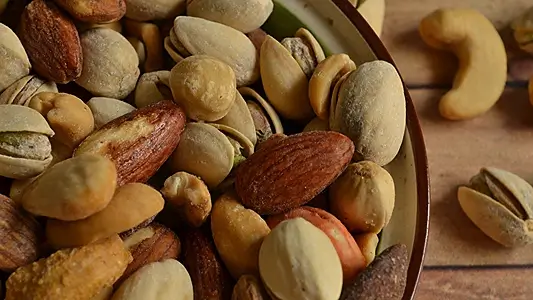Healthy, beautiful hair is a universal desire, reflecting not only aesthetics but overall well-being. Achieving and maintaining such hair involves two factors: proper nutrition and the use of natural hair care products for hair nourishment.
In this article, we’ll explore seven essential nutrients for hair growth and their synergy with DIY natural hair care solutions. These nutrients, backed by science, nurture your hair from within and strengthen it from root to tip. We’ll delve into the science behind these nutrients, where to find them in your diet, and how DIY natural hair care complements these efforts.
Whether you’re addressing hair thinning, promoting growth, or maintaining hair health, join us as we unveil essential nutrient secrets and DIY solutions for your locks. Let’s dive into the world of hair-boosting nutrition and natural care.
The Role of Nutrients for Hair Growth
Healthy hair begins from within, with dietary choices playing a pivotal role in achieving that. Your hair relies on essential nutrients to grow and maintain its strength. Neglecting these nutritional needs can result in a variety of hair issues, including thinning and brittleness.
Essential Nutrient #1 – Biotin
Biotin, often referred to as vitamin H or B7, is one of the essential nutrients that play a significant role in hair health. This B-vitamin is instrumental in the production of keratin, the protein that makes up your hair strands. A deficiency in biotin can lead to brittle hair, hair loss, and even changes in hair color.
You can find biotin in various foods, including eggs, nuts, whole grains, and leafy greens. Incorporating these biotin-rich foods into your diet can contribute to stronger, more resilient hair.
Essential Nutrient #2 – Vitamin E
Vitamin E, an antioxidant powerhouse, is another key player in promoting hair health. This nutrient helps protect your hair from oxidative stress, preventing damage that can lead to breakage and thinning.
You can find vitamin E in various foods, such as almonds, sunflower seeds, and spinach. Additionally, topical application of vitamin E oil can also nourish your hair and scalp, promoting healthier growth.
In the next section, we’ll explore another essential nutrient on our list, iron, and its crucial role in maintaining strong and vibrant hair.
Essential Nutrient #3 – Iron
Iron, often associated with overall vitality, plays a significant role in the health of your hair. Insufficient iron levels can lead to anemia, a condition that can contribute to hair loss and thinning.
Incorporate iron-rich foods like lean meats, lentils, and dark leafy greens into your diet to ensure your body has an adequate supply of this vital nutrient. Moreover, pair iron-rich foods with sources of vitamin C, like citrus fruits, to enhance iron absorption.
Stay tuned as we explore more essential nutrients and their impact on your hair health in the following sections.

Essential Nutrient #4 – Omega-3 Fatty Acids
Omega-3 fatty acids, often celebrated for their heart-healthy benefits, also play a crucial role in supporting hair health. These essential fats nourish the scalp, reduce inflammation, and promote hair density.
To boost your omega-3 intake, consider incorporating fatty fish like salmon, walnuts, and flaxseeds into your diet. You can also explore omega-3 supplements if dietary sources aren’t readily available. Including these sources in your nutrition plan can help maintain a healthy scalp and foster optimal conditions for hair growth.
Essential Nutrient #5 – Vitamin D
Vitamin D, known as the “sunshine vitamin,” plays a significant role in hair follicle health. It helps your hair follicles maintain their growth cycle, promoting a lush and vibrant mane.
To ensure you have sufficient vitamin D, spend time outdoors in the sun, as sunlight triggers its production in your skin. Additionally, include vitamin D-rich foods like fatty fish, fortified dairy products, and eggs in your diet. Adequate vitamin D levels are not only essential for strong bones but also for nurturing your hair from the root.
Essential Nutrient #6 – Protein
Protein is the building block of your hair’s structure, making it an indispensable nutrient for maintaining hair health. Your hair is primarily composed of a protein called keratin, and a steady supply of protein is necessary to repair and strengthen hair strands.
Incorporate lean sources of protein such as poultry, fish, eggs, and plant-based options like beans and legumes into your diet. Maintaining a balanced intake of protein is key to preventing hair breakage and promoting hair thickness.

Essential Nutrient #7 – Zinc
Zinc is a mineral that often flies under the radar, but it’s essential for hair growth and overall hair health. It plays a role in the production of new cells, including those responsible for hair growth and repair.
To ensure you’re getting enough zinc, incorporate foods like lean meats, nuts, seeds, and whole grains into your diet. Keep in mind that excessive zinc intake can have adverse effects, so it’s crucial to strike a balance.
With these seven essential nutrients, you’ve built a solid foundation for healthier, more resilient hair. In the final section, we’ll bring it all together and offer additional tips to help you on your journey to gorgeous locks.
Conclusion
Incorporating essential nutrients into your diet and embracing natural DIY hair care practices can transform your hair’s health. These seven key nutrients, coupled with thoughtful self-care, lay the foundation for stunning, resilient locks. Remember, achieving beautiful hair is a journey—one that combines science, nutrition, and self-care.
Additional Tips and Recommendations
- Stay hydrated: Proper hydration supports overall hair health.
- Avoid excessive heat styling: Heat can weaken and damage hair.
- Use gentle hair care products: Choose sulfate-free, nourishing options.
- Consider professional guidance: Consult a healthcare provider or a dermatologist for severe hair issues.
Articles About DIY Hair Care
- DIY Hair Toner with Fenugreek: Nourish, Lengthen, and Thicken Naturally
- DIY Hair Oil with Fenugreek: A Step-by-Step Guide for Longer and Thicker Hair
- DIY Hair Thickening Cream: Boost Hair Volume Naturally
- Care for Your Hair: Power-Packed DIY Shampoo for Hair Growth and Health
- Revitalize Your Hair with DIY Rosemary Hair Growth Serum: Article and Video Steps
References
- Arck, P. C., & Paus, R. (2006). From the Office of the “Good-Hair-Day”. Clinical and Experimental Dermatology, 31(6), 892-901.
- Rasheed, H., Mahgoub, D., Hegazy, R., & El-Komy, M. (2013). Serum Ferritin and Vitamin D in Female Hair Loss: Do They Play a Role? Skin Pharmacology and Physiology, 26(2), 101-107.
- Sinclair, R. D. (1998). Healthy Hair: What Is It? Journal of Investigative Dermatology Symposium Proceedings, 3(1), 2-5.
- Trüeb, R. M. (2009). Serum Biotin Levels in Women Complaining of Hair Loss. International Journal of Trichology, 1(1), 6-14.
- Vanoosthuyze, K., & Bailey, S. H. (2010). A Review of the Use of Biotin for Hair Loss. Skin Appendage Disorders, 1(2), 86-93.
